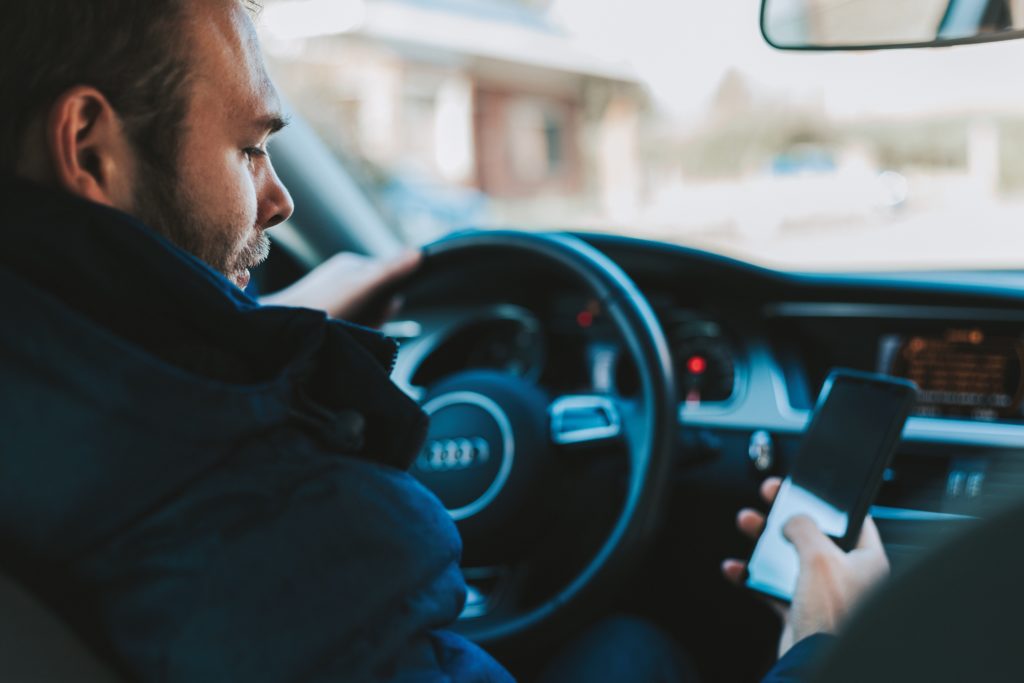Distracted driving is dangerous and is a leading cause of traffic-related crashes, injuries and fatalities. The United States Department of Transportation National Highway Traffic Safety Administration (NHTSA) reports that 3,450 people in the United States were killed as a result of distracted driving in 2016.

Statistics from the Virginia Department of Motor Vehicles Highway Safety Office (DMV) are startling. DMV reports that 26,786 traffic crashes in Virginia 2016 were caused by distracted driving. Fifty seven percent of the crashes resulted in injuries, and 157 people were killed in Virginia crashes. In 2017, distracted driving caused 26,123 traffic crashes. Again, more than half of these crashes resulted in injuries (56 percent). Tragically, the number of people killed as a result of distracted driving increased from 157 to 208.
Virginia is using legislative efforts to combat this national crisis. Since first enacting legislation in 2009, Virginia has steadily tightened restrictions and increased statutory penalties to discourage drivers who engage in distracted driving. This year is no exception, and as of July 1, 2018, any driver who is convicted of texting while driving in a highway work zone will be punished by a mandatory $250 fine (Va. Code Ann. § 46.2-1078.1).
History of Virginia’s Legislative Efforts to Combat Distracted Driving
Virginia first enacted legislation to discourage texting while driving in 2009. The statute – Virginia Code §46.2-1078.1 – has two parts. The first part prohibits drivers in Virginia from texting, defined as manually entering multiple letters or numbers as a means of communicating with another person. The second part prohibits drivers from reading emails and texts while driving, with the exception of using Caller ID. These prohibitions do not apply to the operators of emergency vehicles, any drivers who are lawfully parked or stopped, the use of factory-installed or after-market GPS systems, or to anyone using a handheld device to report an emergency.
When Virginia Code §46.2-1078.1 was first enacted in 2009, violators were subject to a $20 fine for their first offense, and $50 for subsequent offenses. The original version of law stated that police officers could not stop, pull over, or arrest anyone for texting while driving alone. The police had to have another reason to stop, pull over or arrest the driver, before the officer could issue a citation for texting while driving.
Virginia tightened its restrictions on texting while driving just four years later. In 2013, the Virginia General Assembly amended the reckless driving statute, Virginia Code §46.2-868, to ensure that anyone who is convicted of both reckless driving and texting and driving, will be punished by a mandatory minimum fine of $250 (Va. Code Ann. §46.2-868). The General Assembly also increased fines for first time offenders who text while driving from $20 to $125, and for subsequent offenders from $50 to $250 per offense (Va. Code Ann. §46.2-1078.1 ).
Importantly, the General Assembly also removed the restriction on police officers which prohibited officers from enforcing the law unless the police officer had a second reason to effectuate the stop and issue a citation. Police officers now have the authority to enforce the texting while driving law against any driver who violates it. Since 2013, police officers have not needed any other reason to stop, pull over, or arrest any driver who engages in texting while driving.
The following year, in 2014, Virginia required distracted driving to be included as a part of the driver’s license knowledge examination (Va. Code Ann. §46.2-1078.1). And this year, beginning on July 1, 2018, Virginia will punish any driver who is convicted of texting while driving in a highway work zone with a mandatory $250 fine (Va. Code Ann. §46.2-1078.1).
Texting while driving is dangerous, entirely avoidable, and illegal. Virginia lawmakers are to be commended for their continuing efforts to discourage texting while driving, and to make the roads safer for Virginia’s citizens.




